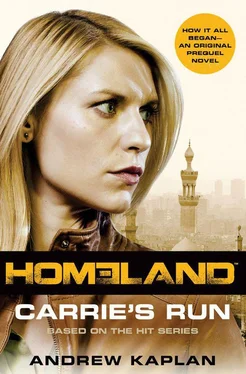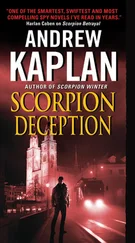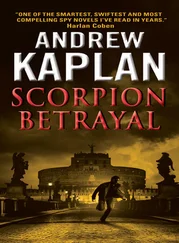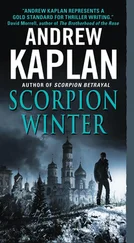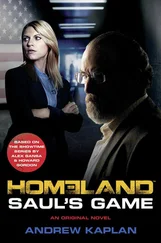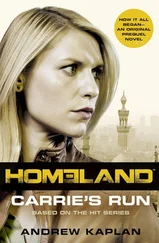Andrew Kaplan - Carrie's run
Здесь есть возможность читать онлайн «Andrew Kaplan - Carrie's run» — ознакомительный отрывок электронной книги совершенно бесплатно, а после прочтения отрывка купить полную версию. В некоторых случаях можно слушать аудио, скачать через торрент в формате fb2 и присутствует краткое содержание. Год выпуска: 2013, Издательство: HarperCollins, Жанр: Триллер, на английском языке. Описание произведения, (предисловие) а так же отзывы посетителей доступны на портале библиотеки ЛибКат.
- Название:Carrie's run
- Автор:
- Издательство:HarperCollins
- Жанр:
- Год:2013
- ISBN:нет данных
- Рейтинг книги:4 / 5. Голосов: 1
-
Избранное:Добавить в избранное
- Отзывы:
-
Ваша оценка:
- 80
- 1
- 2
- 3
- 4
- 5
Carrie's run: краткое содержание, описание и аннотация
Предлагаем к чтению аннотацию, описание, краткое содержание или предисловие (зависит от того, что написал сам автор книги «Carrie's run»). Если вы не нашли необходимую информацию о книге — напишите в комментариях, мы постараемся отыскать её.
Carrie's run — читать онлайн ознакомительный отрывок
Ниже представлен текст книги, разбитый по страницам. Система сохранения места последней прочитанной страницы, позволяет с удобством читать онлайн бесплатно книгу «Carrie's run», без необходимости каждый раз заново искать на чём Вы остановились. Поставьте закладку, и сможете в любой момент перейти на страницу, на которой закончили чтение.
Интервал:
Закладка:
For a long time, he didn’t speak. She looked around at the bare walls and thought about the things that had been done in this room. Perhaps he did too, she thought.
“This is evil,” he said finally, twitching.
“For a greater good. You cut off innocent people’s heads, Walid. Don’t talk to me about evil,” she said.
He looked at her, his eyes narrowed. “There are no innocent people,” he said. “Not me. You?”
She hesitated, then shook her head no.
He twitched his head and exhaled. “What do you want, woman?”
Carrie took a photograph of Dima’s boyfriend Mohammed Siddiqi, a.k.a. Abu Ubaida, out of her pocket.
“You know this man?” she asked. By the expression on his face, she could see that he did.
“Abu Ubaida.” He nodded. “You must know or you wouldn’t ask me.”
“What’s his real name?”
“I don’t know.”
“Yes you do,” she said, crossing her arms in front of her chest.
“ La, truly. I don’t know.”
“What do you know about him? You must know something. Someone must’ve called him something.”
“He is not Anbari, not even Iraqi. Once I heard someone call him ‘Kaden.’ ”
“Where’s he from?”
His face hardened, and he looked at her suspiciously. “You will let me go? Today?”
“But secretly, you will work for me,” she said. “Where did he come from?”
“Palestine, like-” He stopped suddenly.
He had slipped. She jumped at it. “Like whom? Like Abu Nazir? Both Palestinians?” When he didn’t answer, she added, “Your son Gabir’s life hangs by a thread, Walid.”
“As do we all. We are all in Allah’s hands,” he said.
“And in your own. Tell me, they’re Palestinians? Both of them? Is that why they’re so close?”
He twitched and nodded, then: “Maybe not so close anymore.”
“Why? What’s happened?”
“I don’t know. How could I? I’m locked up in here like an animal,” he snapped.
“Then go free. Where is Abu Nazir now?”
“I don’t know. He moves all the time anyway. They say he never spends two nights in the same bed. Like Saddam.” He grinned, showing yellowing teeth.
“And Abu Ubaida? Where is he? Ramadi?”
He nodded, almost imperceptibly. “But not for long,” he said.
“Why? Where is he going?”
He shook his head. For a moment she was afraid he was done talking. Walid was the best shot they had. If she couldn’t get him to commit now-with a major battle for Ramadi coming, according to Dempsey-they would fail. Roll the damn dice, Carrie, she told herself, and stood up.
“Stay or go, Walid. This is the moment,” she said, holding her breath. From somewhere in the prison came the faint sound of someone screaming, but she couldn’t make out the words. Walid must be hearing it, she thought.
“What’s your name?” he asked.
CHAPTER 29
Ramadi, Anbar Province, Iraq
They drove into Ramadi in a Humvee behind a Marine LAV armored personnel carrier, going on the bridge over the Euphrates River to the checkpoint by the electrical power station, the four of them, Carrie, Virgil, Warzer and Dempsey, in U.S. Marine desert combat utility uniforms. The sun was high, the day hot; the temperature was in the nineties, with a fine grit in the air from the desert wind.
They stopped at the checkpoint, a pile of sandbags and concrete. Dempsey got out and briefly talked with the Marines manning it. He came back and slid in behind the wheel.
“Not good,” he told them. “Two police stations got hit last night. Jarheads on IED Avenue got plastered with heavy mortars. Bet they didn’t tell you that at Langley, that AQI has hundred-and-twenty-millimeter mortars and Russian AT-13 Saxhorn missiles? Serious shit. And the hajis have upped the ante. They’re offering two months’ wages to anyone who plants an IED on Route Michigan, the main drag in the city. Three months if it kills any Americans.”
“What do we do?” Carrie asked.
“Have to use RPG Alley,” he grimaced and started driving.
On the way in from Abu Ghraib, Warzer and Dempsey had briefed them. Ramadi was, Warzer had explained, a city of a half million under siege, caught between three forces: al-Qaeda, the Sunni insurgents, and the Marines. A hundred kilometers west of Baghdad on the main highway across the desert, it was, in Dempsey’s words, “easily the most dangerous place on the planet.”
Now, driving onto the main street behind the LAV, Carrie could see what he meant. The street was bordered by rubble from where buildings used to be; the few buildings and power-line poles left standing were Swiss-cheesed with bullet holes. Except for a few mosques and rusted water towers still upright, the city looked like photographs of Germany after World War II, she thought. They passed a deep bomb crater in the road and Virgil glanced at Carrie over the Humvee’s center console, then went back to scanning the street, his M4 ready.
In the distance off to the right, in the direction of a mosque about a quarter of a mile away, its minaret poking up over the buildings, they heard the sound of automatic-weapon fire, followed by staccato bursts from a heavy machine gun. Dempsey turned off the main street, no longer following the LAV.
“He’s going to the Glass Factory,” he explained. A Marine FOB-forward operating base-had been set up there. They on the other hand were headed for a police station in al-Andalus district, where they could set up. As they drove down a narrow street, two Iraqi men dressed in white thaub robes and kaffiyehs and holding AK-47s came out of a café doorway, then sat at a metal table outside over thimble-sized coffee cups and watched the Americans drive by. Dempsey started to speed up, then almost immediately slowed down.
“Shit,” he said.
“What?” Virgil asked.
“Pile of stones on the sidewalk by that corner ahead,” he said.
“What about it?”
“I don’t know. IED maybe.” Dempsey looked left, right, then behind them. “No good way around. Hold on to your favorite body parts, people,” he said, gunning the engine as he raced toward the corner, aiming the Humvee so it would be scraping against the building on the opposite side of the street, as far away as they could get from the pile of stones.
Carrie held her breath, unable to take her eyes from the pile of stones, expecting an explosion as they raced by it. They made the turn onto the next street, where, incredibly, a handful of young boys were kicking a bundle of rags fashioned into a soccer ball in the dusty street.
“Wow,” she said, exhaling.
Unlike children elsewhere in Iraq, none of the boys waved at them or even stopped playing, though the sudden stopping of chatter among them let Carrie know they were aware of the Humvee. After they passed the boys, Dempsey gunned the engine, raising a storm of dust.
Finally, they pulled up to the police station, surrounded by sandbags and manned by Iraqi policemen with AKM assault rifles. Carrie spotted another Iraqi on the roof behind a light machine gun. They got out of the Humvee and went inside, where Dempsey introduced them to Hakim Gassid, the police commander.
“Have you been hit yet?” Dempsey asked him. Police stations were a prime al-Qaeda target, since the Iraqi police and the U.S. Marines were the only forces standing between al-Qaeda and complete control of the city. Not a day went by that policemen weren’t killed and stations attacked, typically with mortars, RPGs and IEDs, and sometimes with attempts to overrun them.
“Twice, but nothing this week, thanks to Allah,” Gassid said.
A few minutes later, Carrie, in full black abaya , and Warzer, wearing a white thaub and a kaffiyeh with the checked pattern of the Dulaimi tribe, left the police station by the back door, taking a motor scooter to Warzer’s cousin’s house on the other side of the river.
Читать дальшеИнтервал:
Закладка:
Похожие книги на «Carrie's run»
Представляем Вашему вниманию похожие книги на «Carrie's run» списком для выбора. Мы отобрали схожую по названию и смыслу литературу в надежде предоставить читателям больше вариантов отыскать новые, интересные, ещё непрочитанные произведения.
Обсуждение, отзывы о книге «Carrie's run» и просто собственные мнения читателей. Оставьте ваши комментарии, напишите, что Вы думаете о произведении, его смысле или главных героях. Укажите что конкретно понравилось, а что нет, и почему Вы так считаете.
